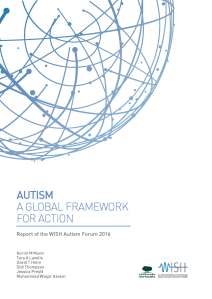 Autism spectrum disorder (ASD) represents a group of lifelong neurodevelopmental disorders emerging during early childhood and interfering with a person’s ability to socially relate to and interact with others.
Autism spectrum disorder (ASD) represents a group of lifelong neurodevelopmental disorders emerging during early childhood and interfering with a person’s ability to socially relate to and interact with others.
As of 2010, there were an estimated 52 million cases of ASD worldwide, representing a substantial increase over the past 40 years. Meanwhile, the economic impact of ASD in the United States (US) alone – based on direct medical, direct non-medical and productivity costs – reached an estimated $268 billion in 2015, a figure that is expected to rise to $461 billion by 2025. ASD and other neurodevelopmental disorders also affect the quality of life of those with the conditions, as well as of their families and caregivers.
The new report ‘Autism: a global framework for action’, which is to be discussed this morning at the World Innovation Summit for Health (WISH) provides an overview of ASD and the challenges we face globally in supporting and caring for those with the condition.
Report focus
 This report offers policy recommendations to improve support for children with ASD, their families, and communities.
This report offers policy recommendations to improve support for children with ASD, their families, and communities.
The causes of ASD are not clear-cut, but evidence suggests that multiple genetic risk factors and environmental factors, including prenatal exposure to drugs, pesticides and viruses, play a role.
Report insights
To date, 86.5 percent of all ASD cases have been reported in high-income countries, where only 20 percent of the population resides. However, this likely reflects a lack of population-based studies in low- and middle income countries, potentially underestimating the number of cases in these countries and under-representing the impact of ASD worldwide.
Policymakers must increase awareness and rates of early diagnosis; ensure that children with ASD have access to evidence-based therapies; implement family support systems; support access to public education, vocational training and assisted employment; and participate in high quality research and surveillance.
The report proposes three primary policy recommendations for policymakers to support a multi-sector response to ASD that encompasses health, education and social services:
- Create an interagency coordinating commission to address ASD nationally.
- Establish interdisciplinary training and research centres for excellence in ASD and neurodevelopmental disorders across the lifespan.
- Establish a global partnership framework to address ASD and neurodevelopmental disorders across the lifespan.
Further Reading
Read the full report here.
Read all the WISH forum reports here.
About the World Innovation Summit for Health (WISH)
WISH focuses on some of the most pressing global health challenges facing governments, health systems and populations. WISH brings together internationally renowned experts, who work with advisory groups to publish evidence-based reports on a range of healthcare topics each year.
Chaired by a team of experts drawn from academia, industry and policymaking, the WISH Forums look in depth at the challenges faced in each area – surveying the literature and interviewing experts in the field. The Forum reports present some of the very best innovations that have been shown to have real impact across the developed and the developing world.
During the Summit, the Forum reports will form the basis of a series of panel discussions hosted by leading experts. The Chair of each Forum will open the panel discussion, focusing on ways key issues can be tackled and considering some of the available innovations that might help.
For further information about WISH and previous conferences, visit their website.